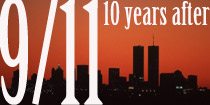9/11, social media and viral news


This is a difficult subject for me to write about. People I know were killed in the attack. I regret to admit that my ability to be rational and logical go out the window when dealing with the subject; my cognitive abilities are lost in a red haze of rage and helplessness.
My wife and I are originally from New York. We lived in Soho, a neighborhood in downtown Manhattan, not very far from the WTC. We could see the twin towers from the roof of our building.
Almost two years earlier, we had moved out to the west coast. The morning of the attack I was having trouble sleeping, so I got on my computer and logged into IRC. For those of you not familiar with it, IRC, or Internet Relay Chat, is a network of servers that allow people to converse in realtime. There are numerous different IRC networks available, such as EFnet and Freenode.
I was chatting with my friends in a tech channel, when someone said, "Turn on the TV. The WTC is on fire." At the time my desktop system had a TV tuner card in it, so I simply launched the TV program and switched to CNN. Apparently a plane had hit one of the towers.
I was shocked. This sort of thing hasn't happened since 1945, where a B-25 bomber accidentally crashed into the Empire State Building due to poor visibility caused by fog. In this modern age that sort of thing was supposed to have been eradicated.
I woke up my wife to let her know, and we watched the news on the TV while I remained on IRC, talking with my friends, speculating on what had happened. Most of the people I knew on the east coast were still on their way to work and wouldn't be online for instant message services like Yahoo, AIM and MSN.
And then we watched in horror as a second passenger jet crashed into the other tower.
I will let the mountains of text and video on the subject speak for themselves. I have no desire to rehash it.
The chat stream on IRC was confused and horrified. I contacted my family members that worked in the city and told them to get away from downtown. Fortunately the phone lines hadn't become overloaded yet. My mother had become trapped in Manhattan and was unable to get home, but at least she was safe. My other family members either worked outside the city or lived uptown and were out of the danger area.
When it was revealed where the perpetrators of the attack came from, the tone in IRC turned ugly. People's moods turned hostile and threatened retaliatory violence. I am not proud of the fact that I was one of those people.
Today, I realize how much things have changed. Back then, there was no Twitter that allowed for instantaneous relaying of news to the world. You had email and instant messenger applications for interacting with individual people, but not with people on a grand scale. There was no viral distribution of news from within countries run by oppressive regimes. The news was from local and cable stations. You got what news they gave you, with no alternatives.
Today, I can only imagine how different it would have been if there were social media outlets like Facebook and Twitter available in 2001. We would have known every detail, instantly, from people on the ground near the location of the attacks.
Unfortunately we would also have the trolls, and the people that hate the United States, posting nasty messages about the victims. Disturbing images in the vein of lolcats, designed to upset and harass people that had already been traumatized.
There is one saving grace to this, however. Just imagine if Twitter had existed back then. And imagine wifi access on the planes that had been hijacked. It's quite possible the terrorists would never have been able to complete their attack, because the entire world would have known what they were doing.